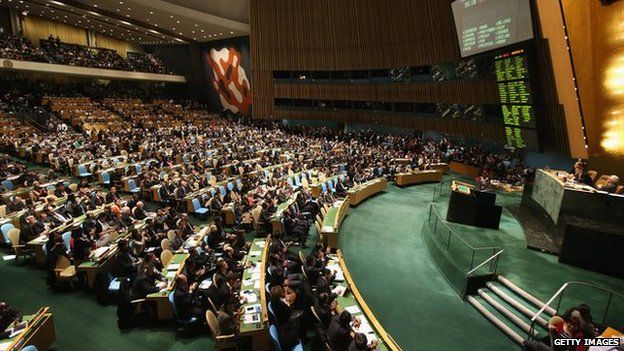World leaders flock to UN General Assembly
- Published

High-speed patrol boats are skimming across the East River. The New York Police Department's mobile canteens will soon arrive, serving coffee and donuts.
A marquee has been erected on the driveway of the United Nations to deprive potential snipers of a line of sight, as world leaders lever themselves out of their limousines.
Even inside the headquarters building, blue partitions have been put up, presumably to sequester the leaders from the journalists who work here day in day out.
With some 140 heads of state and government scheduled to attend, a record-breaking number, leaders' week at the United Nations is like no other.
One place that hoardings have been dismantled is in the renovated auditorium where the UN General Assembly (UNGA) will gather, which could hardly look more resplendent.
Gone is the tar and nicotine that was caked onto the gold-leafed wall that forms a gilded backdrop to the podium.
Gone, too, are the ashtrays in the desks, where diplomats used to stub out their cigarettes and cigars.
Diplomatic speed-dating
This is no longer a smoke-filled room, even if critics of the UN would argue there is no shortage of hot air, and that the General Assembly is little more than a talking shop - long on speechifying, short on concrete achievement.
Now in its 69th year, this annual conflab is regularly likened to a diplomatic trade fair, although with so many leaders in attendance it can also feel like diplomatic speed-dating.
The "UNGA UNGA party" is how one senior UN diplomat jokingly refers to it, in honour of a former participant, Silvio Berlusconi.
This year's cast list not only includes diplomatic A-listers, like Barack Obama, Benjamin Netanyahu and David Cameron, but also celebrity A-listers like Leonardo DiCaprio, Emma Watson and Victoria Beckham.
A headliner from last year's gathering, Iranian President Hassan Rouhani will be making his second appearance.
This year also features debutants like President Abdel Fattah el-Sisi of Egypt, Prime Minister Tony Abbott of Australia, and India's Narendra Modi, who is not only addressing the UN but also a rally at New York's Madison Square Garden arena.
Ukrainian President Petro Poroshenko will address the assembly, but not Vladimir Putin.
The Russian president could have come to New York - after being barred from the recent G7 summit because of Moscow's annexation of Crimea - but chose not to.
Taking place amid a geopolitical whirlwind, the agenda reflects the gravity and multiplicity of global crises.
President Obama, after addressing the assembly on Wednesday, will chair a meeting of the Security Council to address the growing problem of foreign fighters in countries like Iraq and Syria.
Secretary General Ban Ki-moon will convene a meeting on the Ebola crisis in West Africa.
Choreography
There will be separate discussions on a range of subjects including sexual violence in conflict zones, elephant hunting, wildlife protection and the health of women and children (which is where Victoria Beckham steps out). That list is by no means exhaustive.
On Tuesday, Mr Ban will also host a giant climate change summit, attended by Barack Obama among others.
The aim is to galvanise member states in the hope that they will sign up to a comprehensive new global climate agreement at talks in Paris next year.
With so many nations attending and so little time to speak at the one-day meeting, three separate sessions will run simultaneously in three different rooms, a feat of enormous choreographic complexity.
This is where Hollywood actor Leonardo DiCaprio, who now goes by the grand title of UN Messenger of Peace on Climate Change, makes his entrance.
On climate change, the real bargaining is expected to take place at a private dinner on Tuesday hosted by Mr Ban and attended by a select list of 20 or so countries.
However, the absence of the leaders of China, Russia and India - Mr Modi arrives later in the week - does not augur well.
As if there was not already enough going on, nuclear talks between Iran, the US and five other countries have resumed in New York, with the aim of hammering out an agreement before November's deadline.
There will be speculation, too, about a possible meeting between Presidents Rouhani and Obama, the focus of so much speculation ahead of last year's gathering.
Rather than shake hands, Mr Obama ended up telephoning Mr Rouhani as the Iranian president made his way to JFK International Airport.
This year the White House has said it is open to a meeting. However, Mr Rouhani would have to consider the possible backlash back home.
Last year's phone call earned him a public rebuke from Iran's Supreme Leader Ayatollah Ali Khamenei.
Pulling power
The ongoing Iran talks are a reminder that the sidelines diplomacy in group and bilateral meetings is usually more meaningful than the speeches delivered in the General Assembly hall.
With only a few exceptions, they can feel like background noise. Only a handful tend to generate headlines.
For all the refurbishments to the UN complex, there will be the usual calls for the renovation of the institution itself.
The present make-up of the Security Council, which denies permanent seats to Germany, Japan and India among others, has an antique, post-World War II feel.
The present wave of global crises has also raised questions about the UN's ability to deal with them all.
What is striking about the many world problems right now is their transnational, cross-border character.
Islamic State (IS), Ebola, climate change - no nation has the capacity to tackle these issues by itself. That is where the unique convening power of the UN General Assembly should come into own.
In an ever more crowded calendar of summitry, no other international gathering has such pulling power.
- Published30 July 2014
- Published23 September 2013
- Published26 June 2014
- Published28 March 2018